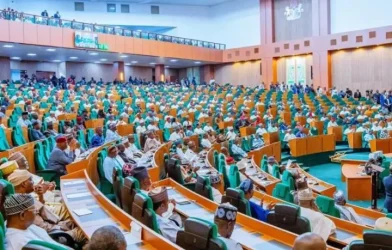About two decades ago, when I arrived in Abuja as a fresh reporter for The Guardian Newspapers, unarguably Nigeria’s largest circulating national daily then, I met a senior colleague who covers the politics beat. He would move on to become a Professor at a prestigious University in Nigeria.
This colleague is Yoruba by tribe but married to someone I call my sister because she is Igbo like myself. This colleague made a telling statement that has become so evergreen that it keeps coming back to my subconscious.
He said then that “poverty is a sin that every right thinking person must work hard to defeat and be marked safe from poverty for life.” He went ahead to draw a comparison between poverty and the most dreaded health affliction then in Nigeria known as Acquired immune deficiency syndrome and stressed that “poverty is a worst affliction than AIDS.”
Clearly, when these aforementioned statements were made, poverty hadn’t become endemic and widespread the way it is now twenty years later. The truth is, poverty walks on four legs in every Nigerian street just as social vices and crimes connected to poverty have become hydra-headed and virtually uncontrollable.
Nigeria can then be said to be a nation state buffeted by mass poverty and high crime rate even as the capacity of the police to control and prevent crimes is waning rapidly by the day. Over 133 million Nigerians are officially multidimensionally poor, i repeat.
So when the Nigerian Economic summit group projected last month that unemployment will escalate to over 37 percent and then the National Bureau of statistics out of the blues, issued a contrary report that only 4 percent of Nigerians are unemployed as against what are the realities physically, millions of Nigerians started doubting the veracity and scientific accuracy of the statistics from the publicly funded National Bureau of statistic (NBS).
The Nigerian Economic summit group (NESG) projected that Nigeria’s unemployment rate will increase to 37 percent while the poverty head will amplify to 45 percent in 2023.
In what is perhaps the most unscientific projection however, the government funded National Bureau for Statistics claimed recently, contrary to their previous rating, that unemployment rate has now dropped to 4.1% in the first quarter of 2023 from 5.3% in the fourth of 2022. This same NBS has a release on the poverty situation whereby it stated that 133 million Nigerians are multidimensionally poor. If we are this poor, how come only 4% of Nigerians don’t have employment if we go by the dubious rating just issued by the ethically challenged NBS?
It is no wonder then that the prominent pro-Democracy group- HUMAN RIGHTS WRITERS ASSOCIATION OF NIGERIA (HURIWA) castigated the National Bureau of Statistics (NBS) for breaching scientific methodology and accuracy of existential, real time facts in reaching a jaundiced determination of what it calls Nigeria’s unemployment rate that in their imagination has recorded a dramatic drop from 33.1 per cent reported in March 2021 to 4.1 per cent for the first quarter of 2023.
HURIWA said the current unemployment data by NBS were generated as a result of intensive and well oiled political blackmail and media propaganda orchestrated straight from the office of the President of Nigeria just to get a quick response to the groundswell of concerns, consternation and worries of millions of Nigerians about the high costs of living and the high inflation rate created by the upward review in the pump price of petrol which has had a spiral effects on the costs of foodstuffs and services in Nigeria.
The National Bureau of Statistics (NBS), it would be recalled, disclosed on Wednesday, when it released its employment data for the first quarter of 2023, indicating a substantial improvement in the job market. It further stated that in Q1,2023, 92.6 per cent of employed persons in Nigeria were in informal employment, which includes agriculture, while 89.4 per cent in informal employment that excludes agriculture.
HURIWA has however blamed the NBS for capitulating to a well orchestrated political propaganda from the office of the Nigerian President which has since the time of the immediate past President produced by the same All Progressives Congress, had blackmailed the National Bureau of Statistics for displaying boldness, charismatic courage and candour, frankness and for relying on credible facts and figures to draw up conclusions on the unemployment or poverty related data about Nigeria and Nigerians. “Appearance of this political piece of jaundiced propaganda by the Tinubu’s government through a contrived unemployment data is far removed from the realities of life in Nigeria of today,” HURIWA asserted.
HURIWA said the current Special Adviser Media and Publicity to President Bola Tinubu who was then a special assistant on media to the then President Muhammadu Buhari had lambasted the NBS for being factually accurate and apolitical with their published statistical data just as he spared no words to discredit the work of this publicly funded agency of the central government.
HURIWA which rubbished the most recent publication on the unemployment rate by the NBS under a new hierarchy, affirmed that the NBS must have relied on voodoo and imaginary reasons when the bureau said the revised methodology defines employed persons as individuals who are working for pay or profit and who worked for at least one hour in the last seven days against 40 hours. “The old methodology placed a range on the working-age population- 15 – 64 years, while considering working hours between 20-39 hours as underemployment, 1-19 hrs as unemployment,” it added.
A closer look at the position of HUMAN RIGHTS WRITERS ASSOCIATION OF NIGERIA (HURIWA) aforementioned, which countered the jaundiced unemployment rating done by the National Bureau of statistics, will get further validation if we analyse recent incident of looting of foodstuffs by Nigerians. What will compel crowds of largely youthful Nigerians to loot warehouses in search of foodstuffs? Surely, poverty, hunger unemployment are key to understanding these scenarios playing out everywhere in the Nigeria of year 2023. It has also received the highest attention of the chief of police of Nigeria which underlines the severity of this situation.
The Acting Inspector General of Police, Olukayode Egbetokun in August 2023 directed Zonal Inspectors General of Police and Command CPs in the 36 states and FCT to halt any further attacks on food warehouses and government strategic reserve facilities to stop looting of foodstuff and essential stuff by Nigerians.
The IGP’s directive followed the recent looting of food warehouses and shops in parts of Adamawa State by citizens reacting to the economic hardship occasioned by government policies and fears that such attacks and looting may spread.
Speaking at a meeting with Strategic Police Managers on the security situation in the country, Egbetokun said, “To ensure that such attacks do not reoccur in other parts of the country, Command CP’s are directed to henceforth emplace round the clock provision of security at all government warehouses as well as strategic storage facilities and never allow the repeat of the Adamawa incidents.
“It must be noted that the Force is poised to provide all necessary support to the Federal Government as it seeks workable solutions and succor to the present economic situation in the country.
“Let me also use this opportunity to commend all Commands of the Force for the most professional manner in which we managed the recent protest by the citizens and the organized Labour such that no single casualty was recorded while the protest lasted.
In July, a report in the press stated that authorities in Nigeria’s northeastern Adamawa state had imposed a statewide round-the-clock curfew to stop widespread looting of food stores in the state capital Yola.
The looting saw hundreds of residents break into public and private warehouses storing grains and other commodities and cart them away.
“The Governor of Adamawa State… Ahmadu Umaru Fintiri has declared a 24-hour curfew on the state, effective immediately Sunday 30th July, 2023,” Humwashi Wonosikou, the governor’s spokesman, said in a statement.
Yahaya Nguroje, Adamawa state police spokesman, said security personnel had been deployed to enforce the curfew.
This reporter blamed the rising poverty rate to the withdrawal of fuel subsidybwhen it stated that, last month Nigeria — the most populous country in Africa and the continent’s largest economy — ended a fuel subsidy regime, leading to petrol prices quadrupling and food prices soaring.
Nigeria’s economy has been weakened by recession and the fallout from Covid-19, making life hard for its 215 million citizens — nearly half of whom live on less than $2 a day.
Online video footage shows residents of Yola looting sacks of grain, cartons of pasta and other household items from a warehouse of Nigeria’s emergency management agency (NEMA).
The plunder prompted NEMA to put its warehouses across Nigeria on alert to forestall possible looting, according to agency sources.
Earlier this year the United Nations predicted that more than 25 million Nigerians would be a “high risk” of food insecurity in 2023.
Besides, last month, a private warehouse in the Kpansia area of Yenagoa used by the Bayelsa State government to store foodstuffs and other materials was invaded by some residents of the state capital who carted away food items and other items.
The items included bags of rice and garri as well as cartons of noodles and bottled water, and they were said to be part of the relief materials donated by some concerned Nigerians during the 2022 flood disaster in the state.
It was learnt that the incident occurred at about 7:30 pm, even as some of the residents stormed the warehouse located along the Isaac Boro Expressway with pick-up vans and private vehicles to move the foodstuffs away, most of which had already gone bad.
While the looting was going on, the state government deployed men from its security outfit called Doo Akpo to disperse the residents and secure the building.
The state government expressed surprise and concern over the invasion of the premises of the privately owned warehouse and described the incident as unwarranted, saying the food items were remnants being gathered for disposal as they were no longer fit for human consumption. Analysts said that Nigerians are currently experiencing an upsurge in food prices. Food prices, such as beef, eggs, and beans, are rapidly rising as the epidemic and flooding have exacerbated the country’s poor agricultural and farming circumstances.
Overall, the cost of food in Nigeria has risen dramatically for families. Market experts have warned that these high costs will continue to rise since farming has become unsustainable mainly due to flooding.
Food stuff prices, such as rice, beans and vegetables are in high levels as consumer demand rises; other items, including fish, poultry, and milk, remain variable due to transportation and processing challenges.
In the same vein, the World Bank has disclosed that no fewer than four million Nigerians were pushed into the poverty trap in the first six months of this year, with another 7.1 million more expected to join the conundrum if properly targeted measures are not taken to manage the impact of fuel subsidy removal.
According to the Washington-based institution, “compensating transfers will be essential in helping to shield Nigerian households from the initial price impacts of the petrol subsidy reform.”
The multilateral development institution which made the disclosure in Abuja, during the launch of the Nigeria Development Update (NDU), also stated that the recent removal of petrol subsidy and the foreign exchange (FX) reforms were critical steps towards addressing long-standing macroeconomic imbalances.
The reforms, it noted, have the potential to establish a solid foundation for sustainable and inclusive growth.
Dissecting the NDU, the World Bank Lead Economist for Nigeria and co-author of the report, Alex Sienaert, said four million more Nigerians were pushed into poverty in the first half of 2023.
Sienaert, who stressed the need for a new social compact to protect poor and most vulnerable Nigerians in the aftermath of fuel subsidy removal, noted that about 7.1 million more Nigerians would further slip into the poverty quagmire at the end of the year if the right incentives were not properly channeled to help poor and vulnerable Nigerians.
Theway to draw to a close this piece is to tell President Tinubu that his solution to the widening spectre of poverty which is to share bags of rice to poor households is grossly incapable of closing the gap between the large pool of poorest of the poor and the few privileged rich elite who are mostly friends of those wielding political power.
Fuel subsidy removal is a catastrophic economic policy that wasn’t thought through before implementation and the hurried decision to share just a few bags of rice is grossly insufficient to solve the poverty situation. Government needs to create the enabling environment for jobs to be practically made available to millions of Nigerians who are even too poor to move around to search for jobs. Fixing local refineries is key to forcing the price if fuel down so the costs of living can become bearable. Over dependency on importation of fuel will compound the poverty situation of millions of Nigerians.
EMMANUEL ONWUBIKO is head of the HUMAN RIGHTS WRITERS ASSOCIATION OF NIGERIA and was NATIONAL COMMISSIONER OF THE NATIONAL HUMAN RIGHTS COMMISSION OF NIGERIA.












Comments are closed